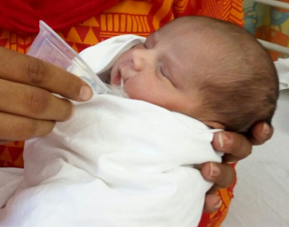Neonatology
Session: Neonatal Clinical Trials 1
472 - Bovine Lactoferrin for Prevention of Late-Onset of Sepsis in Low Birth Weight Infants: A Randomized Controlled Trial
Saturday, May 4, 2024
3:30 PM - 6:00 PM ET
Poster Number: 472
Publication Number: 472.1314
Publication Number: 472.1314

SHABINA ARIFF, MD,FCPS (she/her/hers)
Associate Professor
AKU
karachi, Sindh, Pakistan
Presenting Author(s)
Background: Sepsis remains a significant cause of newborn morbidity and mortality in preterm and low birth weight (LBW) neonates especially in low- and middle-income countries (LMICs). Lactoferrin, a glycoprotein in breast milk with antimicrobial activity, is a low-cost, readily available, and promising intervention currently under investigation. Available literature presents a conflicting impact of lactoferrin on the risk of late-onset sepsis (LOS).
Objective: Our study objective was to evaluate the effectiveness of bovine lactoferrin (bLF) supplementation in preventing LOS and necrotizing enterocolitis (NEC) in preterm and Low birthweight (LBW) neonates in Pakistan.
Design/Methods: A double-blind, placebo-controlled, randomized clinical trial at the Aga Khan University was conducted from July 2019 to August 2020. Preterm (28 to 36+5 weeks gestational age) and low birth weight (≥1000g to < 2500g) neonates who established enteral feeding by 72 hours were eligible. Exclusion criteria included sepsis before randomization, maternal history of chorioamnionitis or group B streptococcus colonization, and congenital anomalies. Enrolled neonates were randomly assigned using a computer-generated random allocation sequence to receive a placebo (D-glucose), 150mg bLF, or 300mg bLF mixed in breast or formula milk once daily for 28 days. Study staff, parents, and outcome assessors were masked to the allocation. The primary outcome was late-onset sepsis from trial entry to 28 days. The secondary outcome was NEC from trial entry to 28 days. Neonates were followed weekly for 28+2 days and episodes of LOS and NEC were recorded.
Results: Of the 305 neonates enrolled, 102 and 203 were randomized to receive placebo and bLF respectively. Outcome data for 291 participants (99 in placebo group, 192 in bLF group) were available for inclusion in the intention-to-treat analysis. There were 8% neonates in the placebo group who were diagnosed with culture-proven sepsis compared to 3.1% in the bLF group (p=0.068). We did not find any difference in episodes of NEC between placebo group (n=16, 16%) and bLF group (n=27, 13%; p=0.559). We reported compliance as 95.7% of the placebo group and 98.4% of bLF group.
Conclusion(s): Bovine lactoferrin supplementation may prevent late-onset sepsis in preterm and low birthweight neonates. However, more trials with larger sample sizes are required to confirm its efficacy in this at-risk group.

.png)
